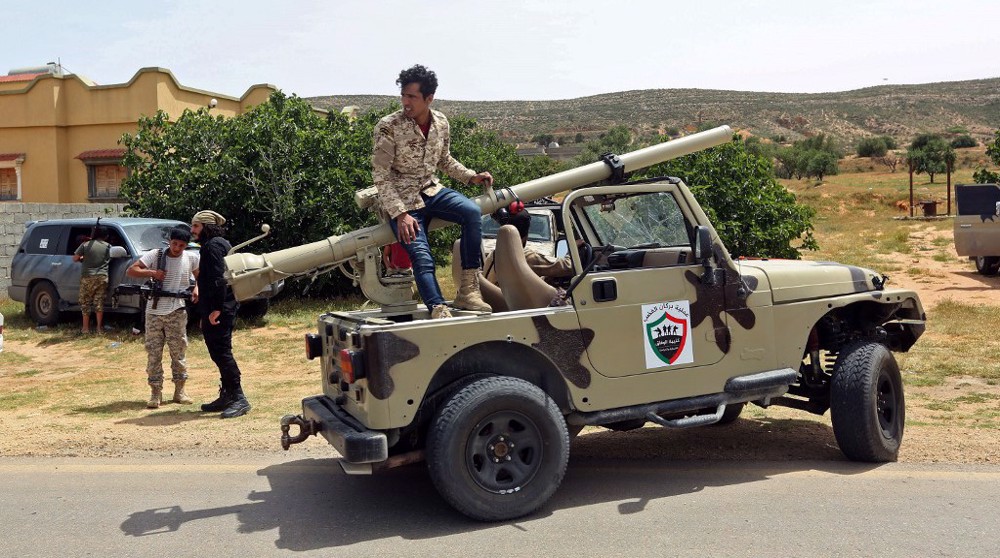EU calls for Ramadan truce in Libya
Major European Union (EU) countries have called for a humanitarian truce in Libya during the Islamic holy month of Ramadan.
In a joint communiqué on Saturday, the foreign ministers of France, Germany, and Italy and senior EU officials reiterated similar calls by United Nations (UN) Secretary-General Antonio Guterres and his acting special envoy to Libya, Stephanie Turco Williams, to observe a truce for the duration of Ramadan.
They also urged the warring sides in Libya to return to the peace talks that started earlier this year in Berlin.
“As participants to the Berlin process and in a renewed commitment to the Berlin conclusions, in this beginning of the Holy Month of Ramadan, we want to unite our voices to those of the UN SG Guterres and his Acting Special Representative for Libya, Williams, in their call for a humanitarian truce in Libya,” the joint communiqué read.
Fighting has in recent weeks intensified between forces loyal to Libya’s internationally-recognized government headed by Prime Minister Fayez al-Sarraj and rebel forces under the command of a renegade general named Khalifa Haftar.
Haftar’s forces launched an offensive to seize control of the capital, Tripoli, last April. They have been bogged down near the city.
Government forces have also intensified operations against the rebels elsewhere in the country since Haftar violated an earlier truce in March.
“The conflict continues unabated and developments during the latest weeks have increased concerns, in particular over the situation among the long suffering Libyan population,” the EU statement said.
It insisted that the warring sides be inspired by the holy month to resume peace talks while focusing their efforts on the global fight against the coronavirus pandemic.

Libyan minister says Haftar forces used nerve gas
Meanwhile, Libyan Interior Minister Fathi Bashagha has accused Russian mercenaries allegedly fighting for Haftar of using the internationally-banned nerve gas against government forces south of Tripoli.
“In the Salah al-Din axis, our fighters were attacked by nerve gas from Haftar’s forces, so they were paralyzed and then sniped. This can only be carried out by the Wagner Group,” Bashagha said, referring to a Russian private security company.
“It is time for the United Arab Emirates (UAE), Egypt, and Russia to stop supporting Haftar and hinder him from terrorizing and targeting civilians. It is also time for these countries to stop facilitating the spread of the coronavirus pandemic inside and outside Libya,” he said.
The rebels receive support from the UAE, Egypt, and Russia, and the Libyan government from Turkey.
On Saturday, a representative for Haftar accused the government and Turkey of attacking civilians in Tarhouna, a town to the south of Tripoli that has been a staging post for the rebels.
Libya rejects EU operation to monitor UN arms embargo
In another development, the EU has launched a new naval and aerial mission in the eastern Mediterranean to enforce a UN arms embargo and prevent weapons from reaching Libya.
The Libyan government has officially announced its rejection of the EU mission, codenamed Operation IRINI.
“There has been no consultation with the GNA on the military operation as stipulated in Security Council resolutions,” Prime Minister Sarraj said, using an abbreviation to refer to the Libyan government.
“The European Union operation neglects monitoring the Libyan air space and the eastern land borders,” Sarraj said.
He said weapons were being delivered to the rebels through the airspace and land borders in the east, where a rival camp — supported by the rebels — has seated itself.
Libya plunged into chaos in 2011, when a popular uprising and a NATO intervention led to the ouster of long-time dictator Muammar Gaddafi.
VIDEO | Report flags India’s violation of rights of Rohingya detainees
Turkey's foreign minister meets Syria's de facto leader in Damascus
'Next to impossible' to rescue patients from Gaza's Kamal Adwan Hospital: Director
VIDEO | Vietnam current prosperity
Report blames gasoil exports for shortage at Iranian power plants
VIDEO | Hind Rajab Foundation names Israeli war criminals vacationing after Gaza genocide
VIDEO | Australians rally for Gaza ahead of Christmas festivities
VIDEO | Attacks on Sana'a










 This makes it easy to access the Press TV website
This makes it easy to access the Press TV website